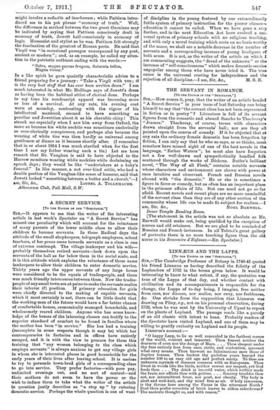A SECRET SERVICE.
[To THE EDITOR Or THE "SPECTATOR"] SITC,—It appears to me that the writer of the interesting article in last week's Spectator on " A Secret Service " has missed one peculiarity which will account for the reluctance of many parents of the lower middle class to allow their children to become servants. In these Radical days the attitude of the small shopkeepers, telegraph employees, school teachers, et hoc genus omne towards servants as a class is one of extreme contempt. The village innkeeper and his wife— probably themselves retired servants—look down upon the servants of the hall as far below them in the social scale, and it is this attitude which explains the reluctance of these same innkeepers to allow their children to enter domestic service. Thirty years ago the upper servants of any large house were considered to be the equals of tradespeople, and there was much friendly intercourse between them. Now the trades- people of any small town are at pains to make the servants realize their inferior (P) position. If primary education for girls were chiefly directed to the making of capable servants, which it most certainly is not, there can be little doubt that the working-men of the future would have a far better chance of comfortable homes, economically managed households, and wholesomely reared children. Anyone who has some know- ledge of the homes of the labouring classes can testify to the superior standard of comfort to be found in families where the mother has been "in service." She has bad a training (incomplete in some respects though it may be) which her contemporaries in factories and in offices have entirely escaped, and it is with the view to procure for them this training that "any woman belonging to the class which employs servants " is always anxious to get any village girls in whom she is interested places in good households for the early years of their lives after leaving school. It is useless to try to persuade town-bred girls of a corresponding class to go into service. They prefer factories—with poor pay, unlimited evenings oat, and no sort of control—and their mothers do not seem to have the power or the wish to induce them to take what the writer of the article in question justly describes as " a step up " by entering domestic service. Perhaps the whole question is one of want of discipline in the young fostered by our extraordinarily futile system of primary instruction for the poorer classes— education it cannot be called. When we have gone a step farther, and in the next Education Act have evolved a uni- versal system of primary schools with no religious teaching, and with only a moral training which rests on no basis worthy of the name, we shall see a notable decrease in the number of servants and a corresponding increase of young hooligans of both sexes. It is not, as the writer of the article on which I am commenting suggests, the " dread of the unknown" or the increase of " self-consciousness " which makes domestic service unpopular among those who have never tried it. The true cause is the universal craving for independence and the
rejection of all discipline.—I am, Sir, &o., M. S. E.






























































 Previous page
Previous page